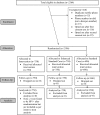A Randomized Controlled Trial to Increase HIV Testing Demand Among Female Sex Workers in Kenya Through Announcing the Availability of HIV Self-testing Via Text Message
- PMID: 30109456
- PMCID: PMC6342831
- DOI: 10.1007/s10461-018-2248-5
A Randomized Controlled Trial to Increase HIV Testing Demand Among Female Sex Workers in Kenya Through Announcing the Availability of HIV Self-testing Via Text Message
Abstract
We assessed whether informing female sex workers about the availability of HIV self-testing at clinics in Kenya using text messages would increase HIV testing rates. We selected a sample of 2196 female sex workers registered in an electronic health record system who were irregular HIV testers and randomized them to be sent a text message announcing the availability of (1) HIV self-test kits sent three times (intervention), (2) general HIV testing sent three times (enhanced standard of care [SOC]), or (3) general HIV testing sent one time (traditional SOC). Participants in the intervention arm were significantly more likely to test for HIV during 2-month follow-up compared to those in the enhanced SOC (OR 1.9, p = 0.001). There was no difference in HIV testing between those in the enhanced SOC and the traditional SOC arms. Announcing the availability of HIV self-testing via text message increased HIV testing among this high-risk group.
Evaluamos si informar a las trabajadoras sexuales femeninas acerca de la disponibilidad de la prueba autoadministrada del VIH en algunas clínicas en Kenia usando mensajes de texto aumentaría las tasas de prueba del VIH. Seleccionamos una muestra de 2196 trabajadoras sexuales femeninas registradas en un sistema electrónico de registros de salud que habían hecho la prueba del VIH irregularmente y las asignamos al azar para recibir mensajes de texto que anunciaba la disponibilidad de (1) botiquines de la prueba autoadministrada del VIH, enviado tres veces (intervención), (2) pruebas estándares del VIH, enviado tres veces (estándar de cuidado [EDC] aumentado), o (3) pruebas estándares del VIH, enviado una vez (EDC tradicional). Fue significativamente más probable que aquellos en el grupo de intervención hicieran la prueba del VIH durante el seguimiento de 2 meses en comparación con aquellos en el EDC aumentado (razón de momios = 1,9, p = 0,001). No hubo diferencias en hacer la prueba del VIH entre aquellos en el EDC aumentado y el EDC tradicional. Anunciar la disponibilidad de la prueba de VIH autoadministrada a través de mensajes de texto aumentó las tasas de prueba del VIH entre este grupo de alto riesgo.
Keywords: Female sex workers; HIV self-testing; HIV testing; Kenya; Randomized controlled trial.
Conflict of interest statement
Conflict of interest
The authors declare that they have no conflict of interest.
Ethical Approval
The study procedures were approved by the City University of New York Institutional Review Board, the Kenya Medical Research Institute Ethics Committee, and the University of KwaZulu-Natal Biomedical Research Ethics Committee.
Informed Consent
We used a passive informed consent process in this study as described in the paper in the section titled “Sample, eligibility and consent.”
Figures
References
-
- UNAIDS. The gap report 2014: sex workers. 2014; http://www.unaids.org/sites/default/files/media_asset/06_Sexworkers.pdf. Accessed 7 Feb 2018.
-
- National AIDS Control Council of Kenya (NASCOP). Kenya AIDS response progress report 2014: progress towards zero. 2014; http://files.unaids.org/en/dataanalysis/knowyourresponse/countryprogress.... Accessed 4 Nov 2017.
-
- Pebody R. Can self-testing engage ‘hard-to-reach’ men with HIV testing? AIDSMap; 2017. http://www.aidsmap.com/Can-self-testing-engage-hard-to-reach-men-with-HI.... Accessed 13 Sept 2017.
Publication types
MeSH terms
Substances
Grants and funding
LinkOut - more resources
Full Text Sources
Other Literature Sources
Medical


